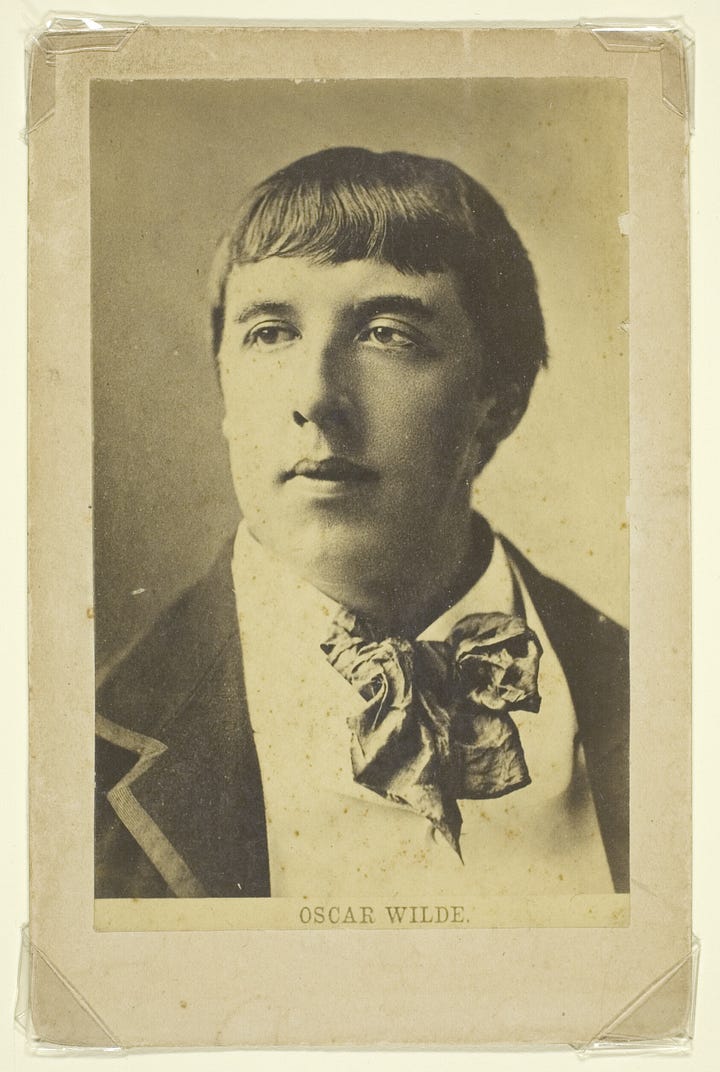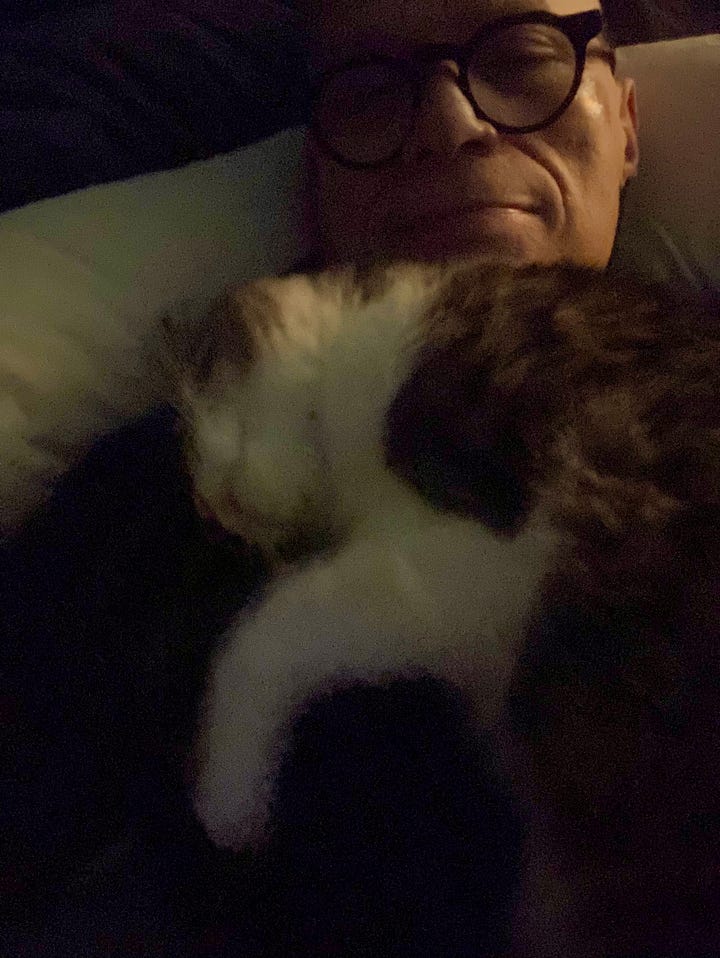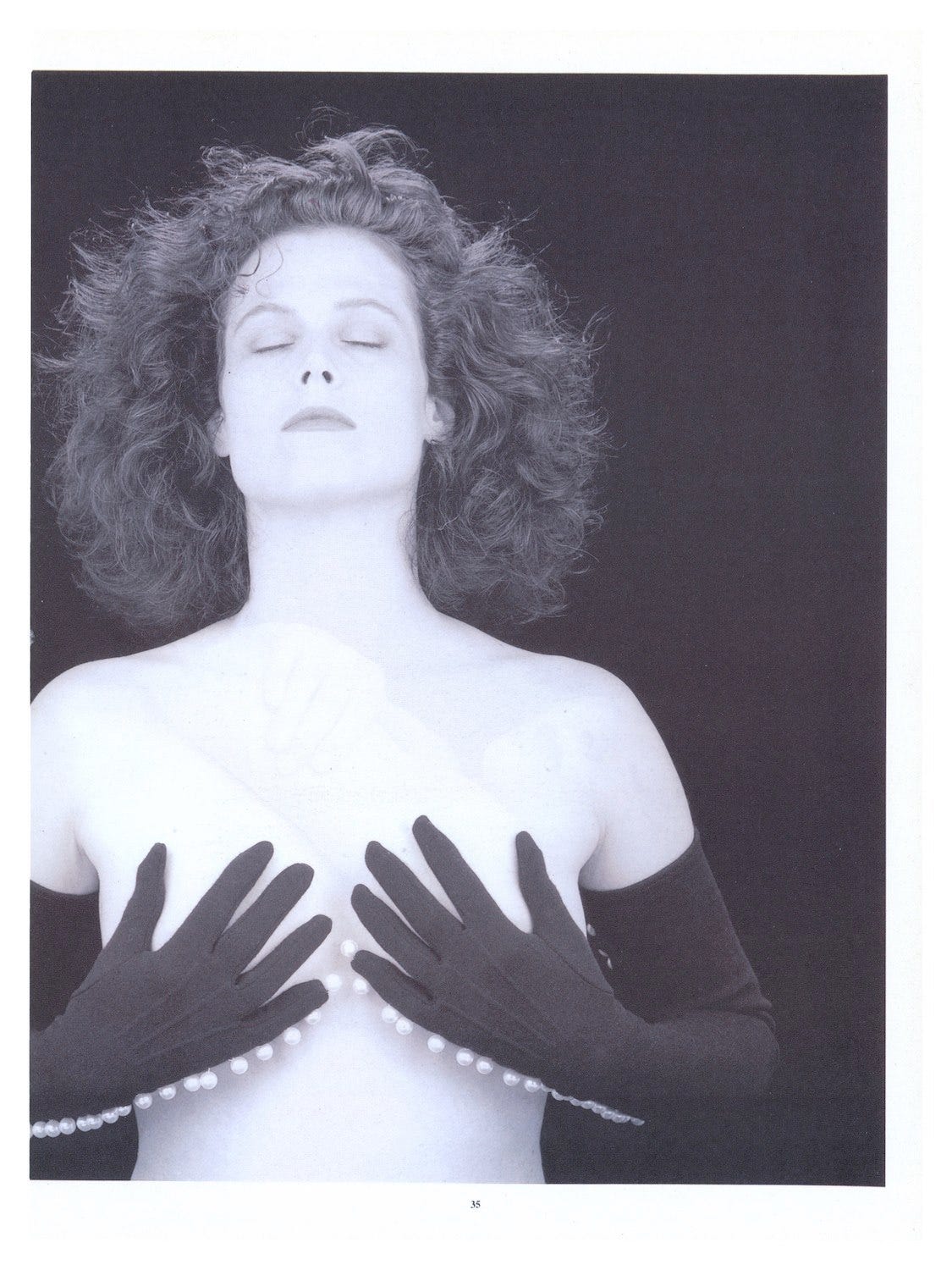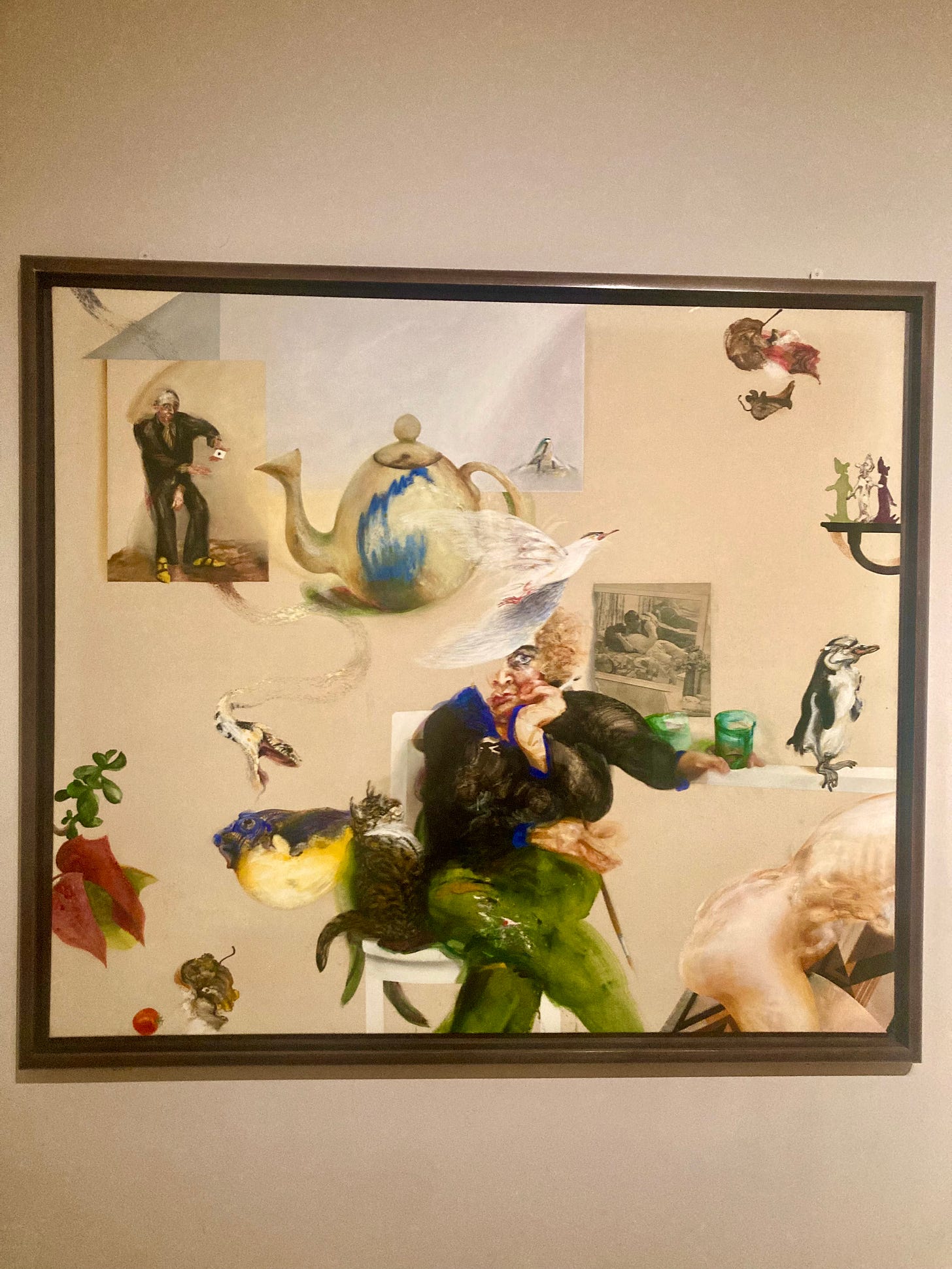LETTER FROM LONDON: 1/10/25
SIGOURNEY, SADNESS, HIV MEDS, THE BEASTLINESS OF LOVE, OSCAR WILDE, AND MEANDERING ABOUT IN THE HALLS OF THE NATIONAL PORTRAIT GALLERY WHERE I FIND COMFORT WHEN IT IS NEEDED (IT'S NEEDED)
1.
On Monday night, I was waiting here on the northbound Bakerloo platform at Baker Street after seeing the lushly soul-swelling Royal Shakespeare Company production of A Midsummer Night’s Dream at the Barbican and thinking about the allusiveness for me of so much of Shakespeare’s language when the English language is also itself the way I find to anchor my life when it too can be allusive, anchorless in this midwinter of it where I have been meandering around in Europe and now again in England and always it seems in me. Allusive. Without an anchor. A soul always sweeping toward some swell. That pretty much sums up the pilgrim’s life. It does mine.
I arrived here on New Year’s Day from Vienna where I had earlier seen at the Burg Kino this film - which I liked more than I thought I would - that was staring back at me now that I had arrived at this latest destination on my continuing pilgrimage. The film’s own narrative destinations - an older queer writer’s ache for human and spiritual connections through sex and love and ritual, the hydra of addiction the hindrance that hews him instead too closely to himself, the displacement if not the diaspora of an expat who just can’t give himself a pat on the back for what it takes to live such a life - confronted me with the connections I felt to them as I waited for the train to take me home to my small room in Kilburn where the night before I dreamt of Vienna and the disorientation I felt there that I blamed on it but was instead - as much plaint as complaint - still there inside me stirring my subconscious, the shadow self that had in its deep sadness descended again where it more darkly and aptly roams in its own kind of pilgrimage after surfacing to cause some dustups in the dirty world where real shadows lurk, run amuck in the light, live alongside it, these serpents tongues that need not language to comprehend themselves only those who need it.
“In deep sadness there is no place for sentimentality,” wrote William Burroughs, no fan of such two-ply plaints, all shadow himself, in Queer. “It is as final as the mountains: a fact. There it is. When you realize it you cannot complain.”
Puck:
“If we shadows have offended,
Think but this, and all is mended,
That you have but slumbered here
While these visions did appear.
And this weak and idle theme,
No more yielding but a dream,
Gentles, do not reprehend:
If you pardon, we will mend:
And, as I am an honest Puck,
If we have unearned luck
Now to 'scape the serpent's tongue,
We will make amends ere long;
Else the Puck a liar call;
So, good night unto you all.
Give me your hands, if we be friends,
And Robin shall restore amends.”
The train arrived. I boarded yet another one.
2.
I saw Sigourney Weaver’s Prospero in director Jamie Lloyd’s production of The Tempest on Tuesday night at the Theatre Royal Drury Lane. I again had problems comprehending the language. I don’t like confessing that about Shakespeare but this column seems to be turning into a confessional. The Tempest is all shadow and light - especially the way it has majestically been manifested to appear rather intergalactic in Lloyd’s reimagining as if Prospero, the possessor of such black-and-white magic, is, with Weaver at its now distaff helm, a theurgical sorceress who hails from the outer regions of the solar system and not the darkest reaches of our subconscious on which she, now the alien, is trying to shine some benighted beams of light before all is too late. And she does rather like, this Prospero, to dose some darkness of her own - feel the theatrical throb of it within her before it becomes presentational - when it seems only we out here in our own theatrical darkness are watching her. It is a play on some final level - and it is considered one of Shakespeare’s last plays - about the exile that all creative people feel in our lives and the journey home that is never really back to one. We think our artistic presence in the world is alchemical as we shift realities to our own makings until we realize we have in the process remade ourselves into the place where home awaits. At least that is what I felt it was about for the first time as I sat in that darkness there along Drury Lane trying to find the language that could alight in comprehension of me
Weaver is not giving a preening star performance which could be so easily accomplished with such a storm-tossed role. Instead, she presides with a stately precision over the production as she does her servants, the sprightly Ariel and the cruder Caliban, and turns Prospero into a conjure woman as proper as she is cagey, one who could have attended the Brearley and Chapin schools in a couple of her manifestations, as did Weaver in a couple of hers, on Manhattan’s Upper East Side. There is a cunning embedded in the role but Weaver overlays her own onto it as she underplays all else. She’s not snotty exactly, nor snooty. But Sigourney - like Prospero - has navigated the various worlds where snoots sniff about. She knows the fragrance and there is the flair of the slightly flared nostril to her performance. An aroma of regality. It finally reaches us where we sit trying to smell what she is smelling up there in the less darkened light above us.
She sits in that darkened light, that black-and-white magic of her sorcery, for much of the performance and I kept wondering why it was seeming so familiar to me as I took her in taking it all in. And then it hit me. One of the last stories I put together back in 1988 when I was Executive Editor of Andy Warhol's Interview magazine was one about Sigourney. I had Robert Mapplethorpe photograph her and Christopher Durang interview her. It was one of my favorite stories to have conjured into being. Robert however was very ill with AIDS and its own manifestations and couldn't move about. He did the whole shoot sitting in a chair and would have to take frequent breaks to revive himself. It was all a little tense and so … well … tender all at the same time. Everyone in the room was aware of his fragility - especially Robert himself. Sigourney was so sweet and patient throughout the whole shoot. It was a heightened atmosphere, and everyone was very quiet. It was if we really were in a hospital room instead of his studio. I remember feeling such sadness and yet such awe that the work itself seemed to be keeping Robert alive.
I convinced Sigourney to remove her top that day as we were talking over in a corner when Robert was taking one of his breaks. "Do it for Robert," I told her. "Surprise him. I know it will energize him, your making such a generous gesture. I won't run any photo you don't want me to run. I’ll give you approval.”
Sigourney agreed to pose for this photo above. She showed such class that day and in showing it there was also a deep concern and respect for Robert, who was equal parts Ariel and Caliban, sprite and demon, darkness and light, in his own black-and-white sorcery as an artist.
Sigourney Weaver sitting up on that stage was Prospero, the Rightful Duchess of Milan whose deeper majesty was that of a magician. But I kept seeing Robert Mapplethorpe sitting there in the majesty of memory.
3.
Robert died of AIDS. I have been lucky that my own being HIV positive arrived along with the meds that could define it not as a death sentence but a manageable disease, chronic if one adheres to the daily regimen of downing a morning pill. I have also been lucky that those pills, so prohibitively expensive, have always been covered by my medical insurance whether furnished by an employer or my buying into Obamacare or qualifying for Medicaid or for the last few years as part of my Medicare. I was therefore shocked and in a tearful panic when I discovered that there had been a change in my current Medicare Advantage policy and was told that this month my HIV med, Genvoya, would cost me $1500 and for the rest of 2025 would be $940 each month. For the last few years I have paid $0 and the most I can ever remember having paid for it is maybe $10. I discovered that Social Security took me off a low-income program into which until this past year I had been automatically enrolled. I was told I had to reapply for it myself now. I had somehow missed this in the forwarded mail that my brother so diligently and digitally sends along to me and about which I feel guilty since it just adds to his already busy life. I hate being a burden to anyone in any way. I am now feeling like I am being one to myself as I set out to try to get this straightened out.
And yet here is the blessing beneath it all: I am here not there. I had already planned to find a doctor in London not only to get some needed blood work done but also to start getting prescriptions for my HIV meds. Last year I was able to get two months of Genvoya for free at an HIV/AIDS clinic here in Soho but was told the second time that they preferred I come back with a prescription. I will also try to do the same thing in Porto and Tangier where I am headed for five months after my three here in London. I am then returning to London in October for six months. So I am hoping to have my HIV meds in some sort of pipeline by then. This is yet another unintended unforeseen blessing of not only finding myself on this pilgrim’s path but also that it is a path not taking me back to America right now where I would be condemned to live under its healthcare system. But I will still try to get my Medicare straightened out.
The other expense - unintended, unforeseen - is my needing a new computer since my keyboard on this one is maddening and problematic and has gone all blooey. It is a chore to write this column on it, as it was the last one. But there is also a blessing beneath that as well. In the last week I have welcomed many new subscribers here to our community and more than a few are paid ones. Those subscriptions are helping me offset the cost for a new computer today when I bite the bullet to buy one. I almost bought one yesterday but when it came time to pay for it, I just couldn’t spend the money. Relative poverty in such moments causes me to panic if not quite tearfully. But I know I have to do it. Moreover, each of these problems is nothing compared to what those in California are dealing with concerning the fires there. I have often been told not to compare and despair but sometimes I even catch myself comparing despair. My heart goes out to those living through such devastation. I have donated a small amount to the Pasadena Humane Society’s Emergency Wildfire Fund.
The new subscriptions were the result of my last column this past weekend when I explained my reasoning for leaving Facebook and Instagram. Since that column, Meta and Mark Zuckerberg have gone full-blown MAGA and I am more certain than ever that my decision to leave those sites was the right one even though I miss those communities there even as we continue to build this one here. That too is a blessing buried beneath what first appears to be a problem: this community. Thank you for being here not there. Thank you.
4.


I attended a theatrical “double feature” on Wednesday, seeing the matinee of Oscar Wilde’s The Importance of Being Earnest at The National Theatre and then the evening performance of Tom Stoppard’s The Invention of Love at the Hampstead Theatre. It was a lot even for a culture vulture/theatre nerd like me, six hours of aphorisms and Greek poetics, archness and classicism, the dictates of class and the didacticism of classrooms, all roaming around under the archways of Oxford and within the performative parlors of both Victorian and Edwardian England.
The National’s Earnest is a huge hit mainly for its director Max Webster’s having so slyly and intelligently and joyously and at times anachronistically taken Wilde’s 1895 comedy of manners and mined it for the doubling and queerness already there in its text. Algernon is now a crossdresser and is played with what is becoming the mischief-and-mirth trademark of Ncuti Gatwa. Hugh Skinner as Jack strikes just the right balance of vulnerability and brio and brilliantly knows when to put a hand on a hip and hope for the best. Cicely (Eliza Scanlen) and Gwendoline (Ronkẹ Adékoluẹjo), each deliciously and individually tart, are revealed to be a twosome themselves. It is all a mishmash of gender and race and time periods. The whole cast is exemplary and hits all the right notes even when it seems as if Snoop Dogg is snooping around in that Victorian country garden where all the petting is going on. But it is Sharon D Clarke’s Lady Bracknell that, cane in hand, walks off with the show. Bracknell is now of Caribbean heritage, a quite pronounced Jamaican lilt lifting her ladylike carriage to the heights of comedic glory. Clarke should clear the shelf already heaving with all her acting awards for the ones she’s sure to secure for this performance. I will never forget her hauteur attached as it were to the utter certainty of her talent and how her presence in that role not only gave safe harbour to all the reinvention going on about her in the production but also for the free-floating sadness I was feeling that afternoon as it settled in too there with her and became transformed into the happy contentment I can feel when a piece of theatre is working, the wonder of that as I sit in the darkness no longer darkly. Wilde’s archness - his need for it - can often leave me feeling sadder somehow. But not in this production which subverts so much of the text and, while doing so, subverted my gloom. Wilde’s glibness finally found a way in this production to gladden my heart which was so longing on Wednesday afternoon to be gladdened.
Here is its curtain call where all the attitude of the production finally blissfully shockingly aurally visually manifested itself:
The classicist and poet, A.E. Housman, was so filled with a kind of melancholic longing himself regarding his own queerness and the fixation he had for one of his Oxford classmates, the athletic science-besotted Moses Jackson, that he redefined that besotted fixation on Jackson as friendship. In a bit of everything-connects, Housman’s poem, “To an Athlete Dying Young” was read at my father’s funeral when he, an all-American basketball player and coach, died at the age of 32. I still long for him and wonder sometimes if that longing, the ardency of grief, is itself a kind of queering of my queerness.
Tom Stoppard’s play about Housman, The Invention of Love, is being given a Hampstead Theatre production, directed by Blanche McIntyre, filled with more ardency than archness. Simon Russell Beale plays the elder Housman and Matthew Tennyson - the great-great-great grandson of Alfred, Lord Tennyson - his younger self. They are a remarkable pairing. Beale’s voice is more than an instrument; it is an orchestration. He always reminds me - as he pulls on my heartstrings no matter the role he’s portraying - of a flautist playing a bassoon. There is a humility to his greatness as an actor. Tennyson’s tentativeness as the younger Housman is so finely tuned - and attuned to Beale’s performance - because of his lack of such as an actor. There is a lot of the usual Stoppardian intellectually stomping about it. He can’t help himself in delighting in his own didactics as any play he has devised whirls all about them. I find delight in getting lost in it all and can often be surprised by how moved I can be suddenly when it all adheres and is emotionally comprehended much like Housman must have felt about himself as he is explained to us in this play.
“Beastliness,” is how Stoppard has a character describe “the love that dare not speak its name”- as Oscar Wilde’s young lover, the poet Lord Alfred Douglas wrote in the last line of this poem “Two Loves” - when a descriptor is all the nomenclature the character can muster. Indeed, in this play in which so much of the action takes place inside Housman’s head in the first throes of his afterlife, Wilde himself makes an appearance toward the end as he too makes a boated entrance in the Stygian gloom and its gloaming. But it is Housman quoting the Greek about love being “a piece of ice held fast in the fist,” that burning sensation that also freezes, which has stayed with me, as has his wisely teasing of one of his students in a remembered reenacted class, “You don't mind? Oh, Miss Burton, you must try to mind a little. Life is in the minding.”
5.


Above is a photo of me last Saturday night with a lobby display at Sadler’s Wells for Matthew Bourne’s latest iteration of his Swan Lake in which the swans are danced by a corps of nicely cut cobs. I can find Bourne’s middlebrow appeal a bit middling but I do appreciate his bringing dance into the lives of audiences that don’t frequent Royal Ballet performances at the Royal Opera House. I am even grateful to Bourne for bringing dance to this other audience. I also appreciate Bourne’s queer take on the Swan Lake tale of interspecies love which takes on the further force of the forbidden that gay men stumble upon when we stumble upon ourselves.
I recently cared for a cat named Grigetto in Vienna while his own human companion who so dearly and deeply loves him was away in Trieste. I had forgotten the otherworldly comfort that a purring cat could offer me when he climbed upon my chest in bed as I was attempting sleep and instead fell under his dreamlike spell of sensuality, a melding of more than man and animal that became instead, as his gentle paws massaged the sound of his purrs into the part of me where my heart resides, the kneading of acknowledged need each for another, the sharing of the shadow that was falling over us and the shedding of all else.
Since my last time in London, I have been in Lisbon, New York, New Orleans, Chicago, Santa Fe, Provincetown, Tunis, Sidi Bou Said, Tangier, Chefchaouen, Rabat, Paris, Vienna, and Prague. But I realized sitting there in the dark the other night at Sadler’s watching Bourne’s ballet simply expecting to be turned on by the sensuality of all those torsos of young male dancers done up like swans who not only had feathers but also maybe some gym memberships that the thing I miss most from all these months of my pilgrim’s path before arriving back here in London are those moments back in the dark in Vienna with a beautiful boy named Grigetto, an animal, a cat, and that closeness of those claws that did not claw, the beastliness of love that bests that other definition that Stoppard stopped his stomping about to have his character too plainly bestow upon the other kind for which I have searched all my life.
6.
One of the first pilgrimages I make when my pilgrimage brings me back to London is to the National Portrait Gallery where its walls filled with a real-life cast of characters watch me as I wander its rooms and hallways. I love reading about them and learning about their own narratives that framed their lives before they found themselves framed upon such walls. I always find each time one new person on whom to focus. This latest arrival here in London led me to this three-armed 1977 self-portrait above of the artist Maggi Hambling holding her life’s essentials: a paintbrush, a drink, a cigarette. Her 1998 public sculpture, A Conversation with Oscar Wilde, is located over on Adelaide Street. At the time of this 1977 self-portrait, her life was “in a muddle.” The teapot was made for her by someone she loved spiritually. But the object of her sexual ardor is in the Bacon-like blur of a body down in the righthand corner. I kept looking at the cat though and thinking of Grigetto and the muddle I made of Vienna while there and how Puck-like but feeling more like Caliban I want to apologize to the city, to some kind people there, and finally to myself, to “make amends ere long;
Else the Puck a liar call.”
7.
This is Em. I saw her twirling with a kind of unalloyed joy at the National Portrait Gallery when I was there but I failed to capture it when she was in the midst of it. I spotted her a few moments later in conversation with her friends and told her what it had meant to me to see her momentarily let loose with such joy and how it had lifted my sadness about the sense I was having of myself these last few days. I asked her if she’d do it again so I could photograph it, recaptured joy all that I could hope for but there was at least some hope in that. She laughed and said sure.
“You don’t mind?” I asked.
“I don’t mind,” she said.
Sometimes life is in the minding.
And other times it is in the minding not.
By doing the former, I’m trying to get to the latter.
Onward …









I just became conscious of the fact that my previously held phobia of long sentences (probably derived from one of those catholic high school nun english teachers) seems to have magically disappeared & I think I can now attribute that to all of the years of following your posts … so thank you for that 😎🍀.
I just upgraded my membership. Your voice is needed now more than ever.